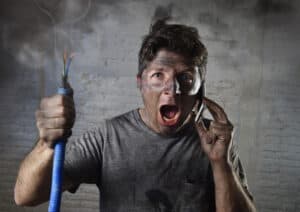
With a free supply of hints, tips and video guides available at the click of a button, you might feel confident about saving a bit of money and tackling tasks that you would otherwise leave to an expert. Before you get started though, it’s worth bearing in mind that British property owners pay out a massive £4.4 billion to repair the damage done by DIY.
If you’re diving into a project remember to take care, make sure you have the tools and knowledge for the job you’re undertaking – and, just as importantly, check your insurance cover before you begin.
Are you covered for Accidental Damage?
Despite our best intentions, accidents do happen. Having the correct home insurance in place before you begin a DIY project could cover the cost to repair or replace broken or damaged items.
You might assume that a home insurance policy will cover your DIY disasters, but Accidental Damage cover can be additional cover with some policies, rather than automatically included. Standard home insurance tends to provide only limited cover for accidental damage to things like windows and bathroom fittings, rather than the effects of a stray drill, spilled paint or blown electrics.
In fact, full Accidental Damage would cover you for the following:
Buildings
- Repair of a burst pipe caused by drilling through the wall to put up a shelf
- Putting your electrics back in working order after a botched rewiring job
- Repairing your ceiling after a foot has gone through the loft floor
Contents
- Replacing your carpet after spilling a tin of paint
- Covering the cost of valuable ornaments damaged by the failure of TV wall mountings
- Replacing garden furniture damaged by falling tree branches
As with every type of insurance cover, there are exclusions and excesses that will apply, so it’s important that you check your cover meets your needs and expectations.
Leave it to the experts
If you’re hapless with a hammer or dodgy with a drill it might be time to admit defeat, accept the limits of your DIY skills and pay for a professional. Some jobs, like those listed below, have a higher risk of going wrong – along with more costly consequences:
- Electrical work
- Plumbing
- Structural renovations
- Roof repair
And when you consider that one in 10 DIY attempts result in the need of a professional after the initial attempt fails, you might actually save yourself time, money and hassle by hiring a qualified tradesman from the outset.
It’s important to make sure your home and contents insurance meets your needs and expectations. Talk to us to find out what you’re covered for – and what you aren’t.


